“Fried rice for me, banku for [my enemies]”
– Ghanaian rapper, Medikal (2019)
The last day of a term is arguably every student’s favourite day of school. In Ghana, particularly among pre-highschoolers, this day is known and celebrated as ‘Our Day’. On the eve of every ‘Our Day’, the kids’ classrooms are rearranged; desks are moved to create a facsimile of a large dinner hall; girls and boys make all sorts of colorful paper decorations with which their classrooms are festooned; those with artistic bones not yet crushed make drawings of all sorts of things on the blackboards… And then on the next day, the D-day, these kids come to school dressed not in boring uniforms, but in their ‘Our Day’ best, bearing baskets filled, alongside drinks, treats and snacks, with food specially made or purchased for the occasion. Among the treats and snacks, in my day, were toffees, chocolates, and biscuits. (The British brand McVitie’s held a monopoly over what luxury biscuits were to be brought to such a special event – Rich Tea, Digestive, Short Bread…) And, from what I remember of Our Day, the food was invariably, rice—jollof rice, white rice with stew, and, chiefly, fried rice.

Perhaps there was that one person who went against the grain one time and came to Our Day with food perceived to be too local, such as boiled yam with nkontomire stew, waakye, gar fotor. Perhaps this person was ridiculed for the most part of the day, right into the early days of the following term, for bringing local food—that is, food we might eat on an ordinary school day, or at home, sitting on the floor—into our special dining hall, designed to look like what our parents, teachers and ourselves had learned from Hollywood and wherever else that dining halls should look like.
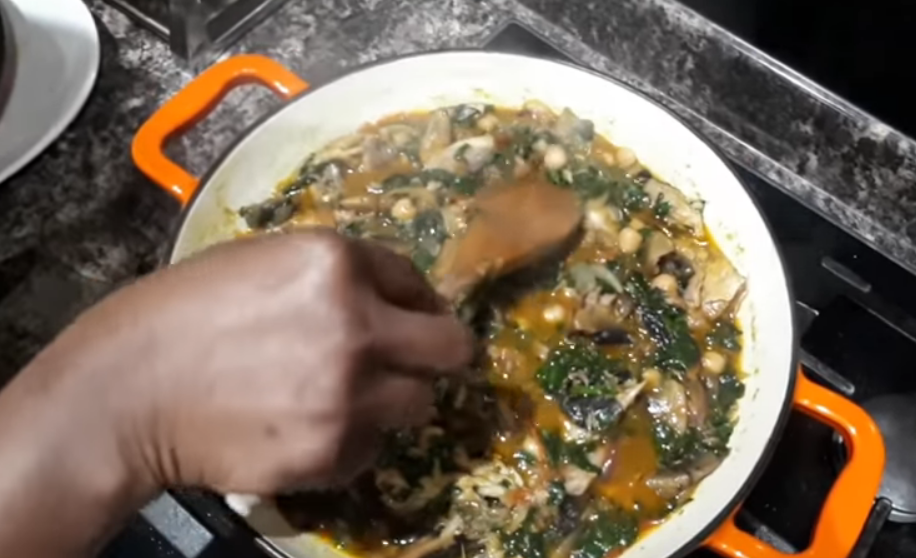
My own Our Days, which ceased about a decade and a half ago, as yet included no serious awareness of a condition named coloniality. Whatever flimsy accounts I may have had of colonialism didn’t equip me to understand that food, alongside eating habits and etiquette, is another site of colonial assault.
There is a gender (and class) dimension to the coloniality of food that complicates or exacerbates troubled gender relations in Ghana.
A scene from a poignant short story by Ama Ata Aido,“For Whom Things Did Not Change,” captures this succinctly. The story takes place a decade after Ghanaian independence from the British colonial regime. Zirigu is a cook-steward at a government rest house where a young medical doctor has come to lodge. In colonial times, Zirigu worked as a cook in white people’s homes.
At the guest house, Zirigu offers his guest food: what would he like for breakfast? “Omelette? Poached eggs? Fried egg on toast? Eggs and bacon? Orange juice…”
And for lunch or supper: “Fried fillet or calf? Braised lamb liver? An escalope of veal with onions and fried potatoes?”

The young doctor wanted none of that. He wanted “food of the land.” But Zirigu has only been trained to cook, and can thus only offer the doctor, what he calls “white mans chop”. His wife can do the ‘food of the land’ business, though, he mentions to his guest. And then, intending to make sense of the situation, the young doctor deconstructs things and makes an unwitting diagnosis:
“As a man of the land and your wife’s husband you do not cook. As a black man facing a white man, his servant, you are a black, not a man, therefore you can cook.”
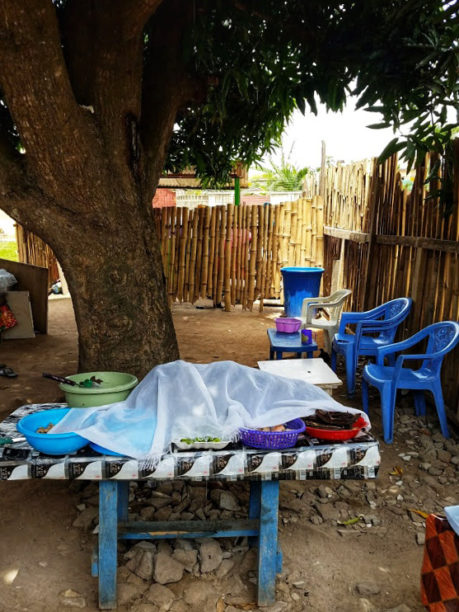 courtesy of the author
courtesy of the authorThis compendium of gender, patriarchy, class and colonialism plays out in how Ghanaian men render services in chop bars vis-à-vis restaurants even today. Chop bars are food joints that serve local meals. These spaces are typically devoid of extravagance, and are therefore congenial to the Ghanaian everyman—yes!—chop bars are usually patronized by men, especially bachelors, who are invariably catered to by women. (DON’T MIND YOUR WIFE, a classic, ubiquitous chop bar name, is telling of this situation.)
February 2016: I have gone to a chop bar and bought fufu with what soup I cannot remember. As I regard the woman serving me my food, a thought came to me, an epiphany: men serving meals is an impossible sight in chop bars; but in restaurants, as waiters, they’re as normal as books in a library.
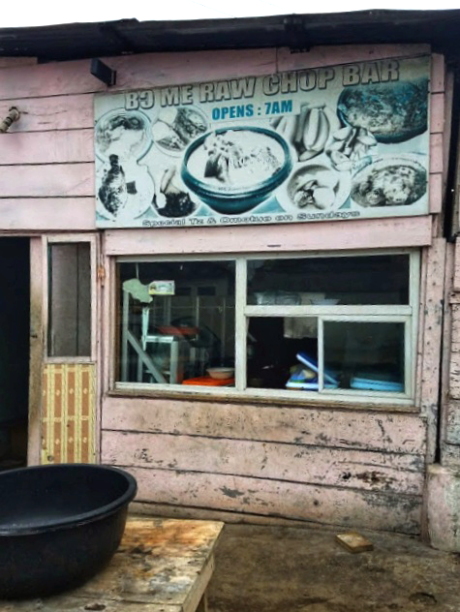 courtesy of the author
courtesy of the authorI walked out of the chop bar with this food for thought; I would ask the why of this on my Facebook; I would throw the matter at characters in a short story I wrote.
Only much later would an answer come to me, just as the thought had come; and the answer is that coloniality is the dot to the i of the issue.
A scene from the Nigerian film Back From The States is worth invoking: two friends are seated at a table, repulsed by the look of the food placed before them. One of them dips his fingers into the soup, and then brings these fingers to his nose, making a sound and a face to express his disgust. (As well, the texture of the soup repulses both of them.) Seconds prior, he had described the meal as “so African.”
Two noteworthy things here. One, had the setting been Ghanaian, this meal would have been a typical chop bar meal; and two, these guys, though African themselves, had just come back from living in a place that is not Africa, America.
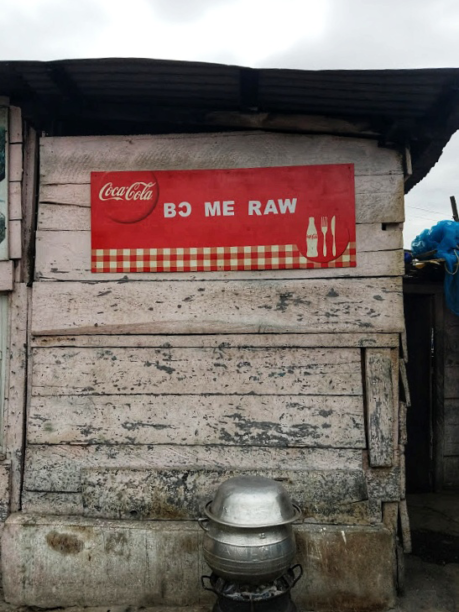 courtesy of the author
courtesy of the authorColoniality creates a multitude of hierarchies in the colonized mind, and the ones in question here are of meals and architecture. In the meal department, the chop bar, with its “so African” cuisine—banku, omo tuo, kokonte eaten with bare hands, is on the ground floor, and the restaurant, with its first world menu—chow mein, foie gras, pizza—towers above.
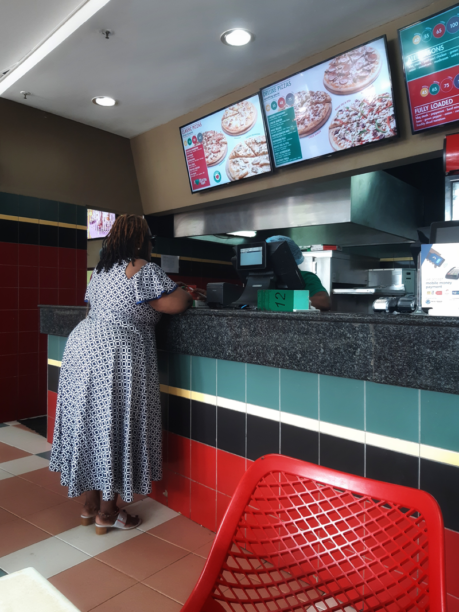 courtesy of the author
courtesy of the authorIn architecture: the chop bar is still at the base, of course. What with its very domesticated space which is set up and feels very much like home, where this Ghanaian man lives; where he, because he has a sister/mother/wife/girlfriend whose ordained duty it is to serve him, does not cook or serve meals. The restaurant maintains its superior position at the top. With its English-speaking environment, cutlery, origami napkins and decor most probably lifted from an eatery somewhere in the supposed first world.
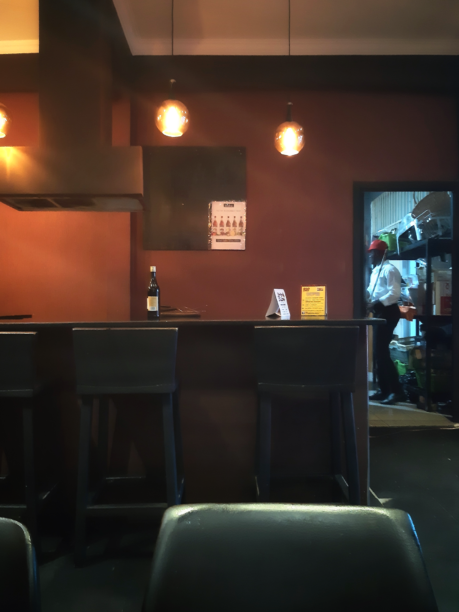 courtesy of the author
courtesy of the authorThis aboveness creates a gloss over the patriarchal shame attributed to the act of a man serving meals. Thus: Zirigu can cook and serve white mans chop, but Goddess forbid that he makes and serves ‘food of the land’, especially not when his wife is alive and still has her limbs intact. Young Selinam, whose boarding school prospectus had stipulated that he come along with a fork and knife among other essentials to learn proper table manners, has no problem waiting tables at the new pizzeria in Accra, but would spit at the idea of serving meals at Heavy Do, though it be an almost-fancy chop bar. Ghanaian dishes such as etɔ and kpokpoi are considered fetish and idolatry among some Ghanaians, thanks to the teachings of colonial Christianity.
In one of my favorite novels, Alice Walker’s The Temple of my Familiar, an African playwright sounds a note of caution to one of his people. “Clean out your ears,” he urges. “The white man is still here. Even when he leaves, he is not gone.” Supposing that ‘white’ here stands for coloniality, and ‘man’ for patriarchy, the “white man” is indeed not gone, decades after Kwame Nkrumah declared the 1960’s as “the decade of African independence.” He is still here, the white man, in the various dimensions of our being—from lingua franca to toilette, plate to palate.






